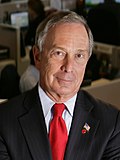| ||||||||||||||||||||
| Registered | 4,095,561 | |||||||||||||||||||
|---|---|---|---|---|---|---|---|---|---|---|---|---|---|---|---|---|---|---|---|---|
| Turnout | 1,154,802 28.19% ( | |||||||||||||||||||
| ||||||||||||||||||||
Bloomberg: 40–50% 50–60% 60–70% 70–80% 80–90% Thompson: 40–50% 50–60% 60–70% 70–80% 80–90% | ||||||||||||||||||||
| ||||||||||||||||||||
| Elections in New York City |
|---|
 |
The 2009 election for Mayor of New York City took place on Tuesday, November 3. Incumbent Michael Bloomberg, an independent who left the Republican Party in 2008, was reelected on the Republican and Independence Party/Jobs & Education lines with 50.7% of the vote, over the retiring City Comptroller, Bill Thompson, a Democrat (also endorsed by the Working Families Party), who won 46.3%. [1] Thompson had won the Democratic primary election on September 15 with 71% of the vote, over City Councilman Tony Avella and Roland Rogers. [2] This was the fifth straight mayoral victory by Republican nominees in New York, and the most recent to date, despite the city's strong Democratic lean in national and state elections.
Contents
- Background
- Republican primary
- Candidates
- Results
- Democratic primary
- Candidates 2
- Campaign
- Results 2
- General election
- Candidates 3
- Debates
- Endorsements
- Polling
- Results 3
- See also
- References
- External links
Six other parties' candidates also contested the general election in November. Stephen Christopher of the Conservative Party of New York won 1.6% of the vote, more than the combined total of all the other minor candidates. [1] The turnout of voters—fewer than 350,000 in September, and fewer than 1.2 million in November—was relatively low for recent mayoral elections, and Bloomberg won with fewer votes than any successful mayoral candidate had received since women joined the city's electorate in 1917. Democrats flipped back the borough of Brooklyn.
Before the election, the New York City Council voted to extend the city's term limits, permitting Bloomberg (previously elected in 2001 and 2005) and other second-term officeholders, such as Thompson, to run for a third term. [3] Attempts to put this decision to a popular referendum, [3] to reverse it in the federal courts, [4] or to override it with state legislation were unsuccessful.
As of 2025, this is the last mayoral election in which a candidate on the Republican ballot line carried Manhattan or Queens. It is also the last time that a candidate on the Republican line won more than 30 percent of the vote, and only the fifth time since 1969 (not counting Ed Koch winning his second term with the endorsement of both major parties in 1981).




